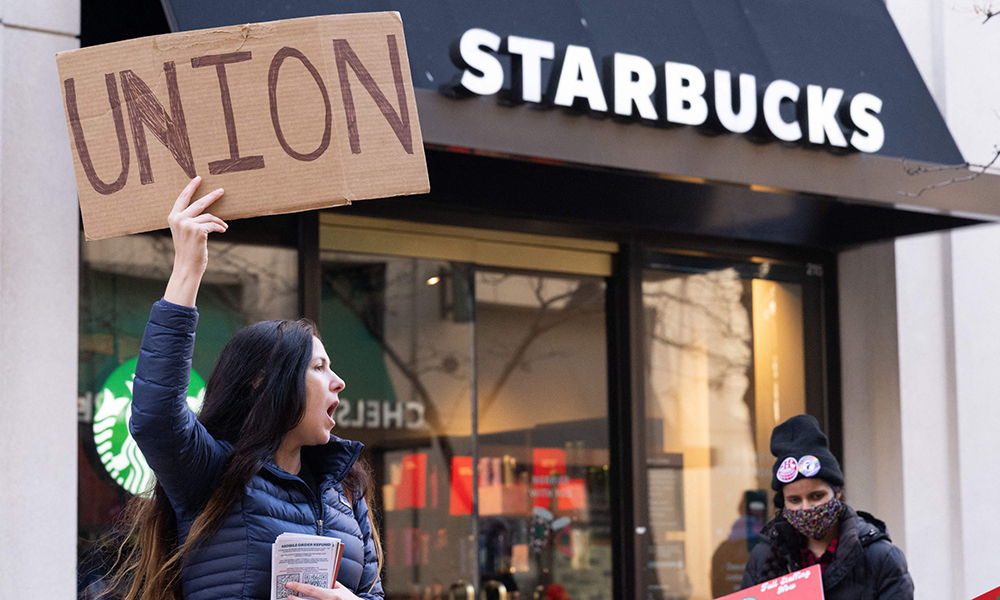
在美國勞動節,有人看到公司與工人之間的沖突加劇,他們不禁會問:“你支持哪一方?”
我理解雙方的立場。作為第三代工會成員,我很清楚許多勞動者內心的憤怒,因為他們努力通過加入工會改善自己的生活,卻往往會有充滿敵意的雇主決心打敗他們。但作為一家在工會市場持續增長的保險和投資公司的CEO,我也知道雇主和工人可以站在同一個陣營。
但這需要美國公司自愿地接受,或者更現實一點因為法律強制規定而接受,公司可以繁榮發展并維護其股東的利益,同時也能尊重員工的權利。
成百上千萬的勞動者面臨低工資、福利稀缺和退休生活毫無保障的前景,而公司利潤卻在飆升,高管年薪平均達到1,770萬美元,因此大多數工人表示想要加入工會。參與工人聯合行動的任何人首先都要回答一個問題:我們是否被允許組織工會?公司是否會允許?盡管美國法律在89年前就已經確立了組織工會的權利,但人們依舊會心存疑慮。事實上,雇主已經學會了如何程式化地操縱這種制度。
美國公司每年支付近5億美元給反工會顧問,以挫敗工人組織工會的行動。管理者強迫工人參加一對一的強制會議,并通過盤問工人確定有哪些他們的同事支持工會。接近一半雇主以失去工作威脅工人,而且近五分之一的雇主會把威脅變成實際行動。即使工人克服重重困難取得勝利,雇主也會拖延談判工會合同中的保護和福利條款,令工人對工會失去信心。
工人克服各種困難的例子令人備受鼓舞,而且工會選舉勝利的情況也在大幅增多。這是因為工人希望通過加入工會,爭取平均工資上漲10%,獲得更安全的工作場所、更有保障的退休生活,以及更有可能享受帶薪病假和雇主支付的醫療保險等。
多年前,當工會成員比例最高時,收入不平等程度降至最低,這并非巧合。那段時間是美國中產階級誕生和經濟生產力增長最快的時期。當工會最強大的時候,更多工人和他們的家人過上了中產階級的生活,這對美國是有利的。我出生在田納西州的一個工會家庭,因此我親身體會到了加入工會所帶來的財務保障福利。
我的祖父在上世紀50年代加入工會,當時正是工人運動蓬勃發展的時期。這并非巧合——這是富蘭克林·羅斯福總統支持《瓦格納法案》(Wagner Act)的直接結果。他聲稱該法案旨在保證工人有選舉工會的自由。該法案確立了一個信條,即公司不僅要對股東負責,還要對包括員工在內的所有利益相關者負責。該項法案實施之后,美國公司依舊繁榮發展。然而,后來聯邦和各州的法律修改,使雇主有更多手段打壓組織工會的努力,并恐嚇尋求集體力量的工人。
現在我們需要一部新的《瓦格納法案》。正在等待通過的《保護組織權法案》(PRO Act),或許改成《恢復美國夢法案》更貼切。這樣一部法律將規定,公司禁止工人加入工會是違法行為,而且幾乎可以肯定的是,大多數美國人一定能在自己的工作場所內建立一家工會。
法律還將使那些尊重工人自由選擇權的公司受益,結束公司之間的向下競爭,創造公平的競爭環境。公平保護組織工會的權利,將有助于解決美國生活在貧困中的1,200萬兒童的問題。這項法律可以解決一個令人羞愧的問題,即四分之一50歲以上的成年人沒有退休儲蓄,還能改善越來越多美國人必須從事多份工作才能維持生計的現象。應對貧困問題的一個重要解決方案就是工會。
對于大多數美國人而言,似乎美國的每一天都是“公司節”,卻只有一天是在向維持美國經濟運行的工人致敬。在這樣一個勞動節,無論是遵守規則的公司、希望獲得應得的公平待遇的新一代多元化的工人、希望獲得他們支持的政治候選人,還是關心美國未來的任何人,所有人應該帶頭努力,恢復工人組織工會以改善生活的自由。(財富中文網)
本文作者布萊恩·J·黑爾是Ullico公司總裁兼CEO。Ullico是美國唯一一家由工人所有的保險和投資公司。
Fortune.com上發表的評論文章中表達的觀點,僅代表作者本人的觀點,不能代表《財富》雜志的觀點和立場。
譯者:劉進龍
審校:汪皓
在美國勞動節,有人看到公司與工人之間的沖突加劇,他們不禁會問:“你支持哪一方?”
我理解雙方的立場。作為第三代工會成員,我很清楚許多勞動者內心的憤怒,因為他們努力通過加入工會改善自己的生活,卻往往會有充滿敵意的雇主決心打敗他們。但作為一家在工會市場持續增長的保險和投資公司的CEO,我也知道雇主和工人可以站在同一個陣營。
但這需要美國公司自愿地接受,或者更現實一點因為法律強制規定而接受,公司可以繁榮發展并維護其股東的利益,同時也能尊重員工的權利。
成百上千萬的勞動者面臨低工資、福利稀缺和退休生活毫無保障的前景,而公司利潤卻在飆升,高管年薪平均達到1,770萬美元,因此大多數工人表示想要加入工會。參與工人聯合行動的任何人首先都要回答一個問題:我們是否被允許組織工會?公司是否會允許?盡管美國法律在89年前就已經確立了組織工會的權利,但人們依舊會心存疑慮。事實上,雇主已經學會了如何程式化地操縱這種制度。
美國公司每年支付近5億美元給反工會顧問,以挫敗工人組織工會的行動。管理者強迫工人參加一對一的強制會議,并通過盤問工人確定有哪些他們的同事支持工會。接近一半雇主以失去工作威脅工人,而且近五分之一的雇主會把威脅變成實際行動。即使工人克服重重困難取得勝利,雇主也會拖延談判工會合同中的保護和福利條款,令工人對工會失去信心。
工人克服各種困難的例子令人備受鼓舞,而且工會選舉勝利的情況也在大幅增多。這是因為工人希望通過加入工會,爭取平均工資上漲10%,獲得更安全的工作場所、更有保障的退休生活,以及更有可能享受帶薪病假和雇主支付的醫療保險等。
多年前,當工會成員比例最高時,收入不平等程度降至最低,這并非巧合。那段時間是美國中產階級誕生和經濟生產力增長最快的時期。當工會最強大的時候,更多工人和他們的家人過上了中產階級的生活,這對美國是有利的。我出生在田納西州的一個工會家庭,因此我親身體會到了加入工會所帶來的財務保障福利。
我的祖父在上世紀50年代加入工會,當時正是工人運動蓬勃發展的時期。這并非巧合——這是富蘭克林·羅斯福總統支持《瓦格納法案》(Wagner Act)的直接結果。他聲稱該法案旨在保證工人有選舉工會的自由。該法案確立了一個信條,即公司不僅要對股東負責,還要對包括員工在內的所有利益相關者負責。該項法案實施之后,美國公司依舊繁榮發展。然而,后來聯邦和各州的法律修改,使雇主有更多手段打壓組織工會的努力,并恐嚇尋求集體力量的工人。
現在我們需要一部新的《瓦格納法案》。正在等待通過的《保護組織權法案》(PRO Act),或許改成《恢復美國夢法案》更貼切。這樣一部法律將規定,公司禁止工人加入工會是違法行為,而且幾乎可以肯定的是,大多數美國人一定能在自己的工作場所內建立一家工會。
法律還將使那些尊重工人自由選擇權的公司受益,結束公司之間的向下競爭,創造公平的競爭環境。公平保護組織工會的權利,將有助于解決美國生活在貧困中的1,200萬兒童的問題。這項法律可以解決一個令人羞愧的問題,即四分之一50歲以上的成年人沒有退休儲蓄,還能改善越來越多美國人必須從事多份工作才能維持生計的現象。應對貧困問題的一個重要解決方案就是工會。
對于大多數美國人而言,似乎美國的每一天都是“公司節”,卻只有一天是在向維持美國經濟運行的工人致敬。在這樣一個勞動節,無論是遵守規則的公司、希望獲得應得的公平待遇的新一代多元化的工人、希望獲得他們支持的政治候選人,還是關心美國未來的任何人,所有人應該帶頭努力,恢復工人組織工會以改善生活的自由。(財富中文網)
本文作者布萊恩·J·黑爾是Ullico公司總裁兼CEO。Ullico是美國唯一一家由工人所有的保險和投資公司。
Fortune.com上發表的評論文章中表達的觀點,僅代表作者本人的觀點,不能代表《財富》雜志的觀點和立場。
譯者:劉進龍
審校:汪皓
On Labor Day, some see the growing clash between corporations and workers and ask, “Which side are you on?”
I’ve seen both sides. As a third-generation union member, I know the anger many working people feel as they struggle to improve their lives by joining together in a union, only to face a hostile employer determined to defeat them. But, as the CEO of a growing insurance and investment company in the union marketplace, I also know employers and workers can be on the same side.
But that will take corporate America to accept—voluntarily or, more realistically, through legal compulsion—that companies can thrive and serve their shareholders, while still respecting the rights of their workers.
As millions of working people struggle with low wages, scarce benefits, and the prospects of an insecure retirement—all while corporate profits soar and executive compensation averages $17.7 million a year—a majority of workers say they want a union. Yet anyone who has been close to an effort by workers to unite knows their first questions: Are we allowed to do this? Will the company permit it? That, despite the fact that the right to a union has been enshrined in U.S. law for 89 years. The truth is employers have learned to routinely game the system.
Corporations spend nearly a half-billion dollars a year on anti-union consultants to defeat workers’ organizing efforts. Managers force workers into one-on-one mandatory meetings and interrogate them to determine who among their co-workers is pro-union. Nearly half of employers threaten workers with job loss, and nearly a fifth follow through on the threat. And when, against all odds, workers win, employers stall negotiating the protections and benefits of a union contract so that workers lose faith.
There are inspiring examples of workers overcoming the odds—union election wins are surging. That’s because workers want the on-average 10% more pay, safer workplaces, secure retirements, and greater likelihood of paid sick leave and employer-paid healthcare that come with a union.
It is no coincidence that years ago when the percentage of workers in unions was highest, income inequality was lowest. Or that that’s when our country’s middle class was born and our economy saw its biggest productivity gains. When unions were strongest, more workers and their families led middle-class lives, and that was good for America. Growing up in a union family in Tennessee, I know first-hand the benefits of the financial security offered by union membership.
My grandfather joined a union in the 1950s during a period of tremendous growth for the labor movement. This was no accident—it was a direct result of President Franklin Roosevelt’s championing of the Wagner Act, which he declared was to ensure that workers had the freedom to choose a union. The act enforced the creed that corporations owed allegiance not only to shareholders but also to stakeholders, including their own employees. With that enforcement, corporate America still thrived. However, later legal changes at the federal and state level have empowered employers to stifle organizing efforts and bully workers who pursue collective power.
It’s time for a new Wagner Act. Waiting in the wings is the PRO Act, which could be more aptly named the Restoring the American Dream Act. Such an act would outlaw much of the corporate behavior that blocks workers from joining a union, and it is a near certainty that the majority of Americans would have what they want—a union in their own workplace.
Such a law would benefit companies that respect workers’ freedom to choose, ending a race to the bottom and leveling the competitive playing field. Fair protection for union organizing would begin to address the 12 million children in the U.S. who grow up in poverty. It could correct the shame that one in four adults older than 50 have no retirement savings, and it would address the growing number of Americans who must work multiple jobs to make ends meet. Poor is a four-letter word, and a big part of the solution is a five-letter word: union.
To most Americans, it seems every day in our country has become Corporation Day, leaving only one day to honor the workers who make America work. On this Labor Day, all of us—companies that play by the rules, a new diverse generation of workers who want and deserve their fair share, candidates for office who want their support, and anyone concerned about the future of America—should lead the effort to restore the freedom of workers to unite in a union to improve their lives.
Brian J. Hale is president and CEO of Ullico Inc., the only labor-owned insurance and investment company in the United States. The opinions expressed in Fortune.com commentary pieces are solely the views of their authors and do not necessarily reflect the opinions and beliefs of Fortune.






